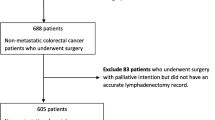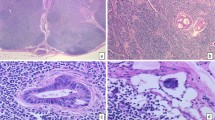Abstract
PURPOSE: Nodal metastasis is the best predictor of survival for patients with colon cancer. Statistical models based on random distribution of positive lymph nodes suggest that to correctly classify nodal status with 95 percent confidence, 20 nodes are needed for T1 lesions, 17 nodes for T2, and 15 nodes for T3. The mean number of nodes identified in American patients is 8, suggesting that they might not be accurately staged. Patients in our tumor registry staged as “node-negative” had a short survival when they had ≤10 lymph nodes evaluated when compared with patients with >10 lymph nodes evaluated (p<0.01). We hypothesized that the use of sentinel lymph node may assist in the staging of colon cancer. METHODS: Thirty-eight consecutive patients with colon lesions were prospectively enrolled into this trial between February 1998 and November 1999. Thirty-one patients met criteria for analysis. During surgery, Lymphazurin blue dye was injected subserosally into the area around the tumor. Routine nodal evaluation, with extra cuts of all sentinel nodes, was undertaken. RESULTS: At least one sentinel lymph node was found in 18 of 31 patients (58 percent). Sensitivity of 67 percent, specificity and positive predictive value of 100 percent, and negative predictive value of 94 percent were found when sentinel lymph nodes were identified. In 2 of these 18 patients, the sentinel lymph node was the only positive lymph node found. CONCLUSIONS: Application of the sentinel lymph node technique to colon cancer may make it easier to identify lymph nodes most likely to contain metastatic disease, potentially “down-staging” more patients. This may have implications in postoperative care.
Similar content being viewed by others
References
Compton C, Henson D, Hutter R, Sobin L, Bowman H. Updated protocol for the examination of specimens removed from patients with colorectal carcinoma: a basis for checklists. Arch Pathol Lab Med 1997;121:1247–54.
Maurel J, Launoy G, Grosclaude P,et al. Lymph node harvest reporting in patients with carcinoma of the large bowel: a French population-based study. Cancer 1998;82:1482–6.
Ratto C, Sofo L, Ippoliti M,et al. Accurate lymph-node detection in colorectal specimens resected for cancer is of prognostic significance. Dis Colon Rectum 1999;42:143–58.
Goldstein NS, Sanford W, Coffey M, Layfield L. Lymph node recovery from colorectal resection specimens removed for adenocarcinoma: trends over time and a recommendation for a minimum number of lymph nodes to be recovered. Am J Clin Pathol 1996;106:209–16.
Caplin S, Cerottini J-P, Bosman FT, Costanda M, Givel J. For patients with Dukes' B (TNM stage II) colorectal carcinoma, examination of six or fewer lymph nodes is related to poor prognosis. Cancer 1998;83:666–72.
Hernanz F, Revuelta S, Redondo C, Madrazo C, Castillo J, Gomez-Fleitas M. Colorectal adenocarcinoma: quality of the assessment of lymph node metastases. Dis Colon Rectum 1994;37:373–6.
Rodriquez-Bigas MA, Maamoun S, Weber TK, Penetrante R, Blumenson L, Petrelli N. Clinical significance of colorectal cancer; metastases in lymph nodes < 5 mm in size. Ann Surg Oncol 1996;3:124–30.
Herrera-Ornelas L, Justiniano J, Castillo N, Petrelli N, Stulc J, Mittelman A. Metastases in small lymph nodes from colon cancer. Arch Surg 1987;122:1253–6.
Koren R, Siegal A, Klein B,et al. Lymph node-revealing solution: simple new method for detecting minute lymph nodes in colon carcinoma. Dis Colon Rectum 1997;40:407–10.
Scott KW, Grace RH. Detection of lymph node metastases in colorectal carcinoma before and after fat clearance. Br J Surg 1989;76:1165–7.
Haboubi NY, Abdalla SA, Amini S,et al. The novel combination of fat clearance and immunohistochemistry improves prediction of the outcome of patients with colorectal carcinomas: a preliminary study. Int J Colorectal Dis 1998;13:99–102.
Greenson JK, Isenhart CE, Rice R, Mojzisik C, Houchens D, Martin EW Jr. Identification of occult micrometastases in pericolic lymph nodes of Dukes' B colorectal cancer patients using monoclonal antibodies against cytokeratin and CC49: correlation with long-term survival. Cancer 1994;73:563–9.
Liefers GJ, Cleton-Jasen AM, van de Velde CJ,et al. Micrometastases and survival in stage II colorectal cancer. N Engl J Med 1998;339:223–8.
Steele GD Jr. Colorectal Cancer. In: McKenna RJ, Murphy GP, eds. Cancer surgery. Philadelphia: JB Lippincott, 1984:126–8.
Ratto C, Sofo I, Ippoliti M,et al. Accurate lymph-node detection in colorectal specimens resected for cancer is of Prognostic significance. Dis Colon Rectum 1999;42:143–58.
Cote R, Houchens D, Hitchcock C,et al. Intraoperative detection of colon cancer micrometastases using125I-radiolabeled monoclonal antibody CC49. Cancer 1996;77:613–20.
Adell G, Boeryd B, Franlund B, Sjodahl R, Hakansson L. Recurrence and prognostic importance of micrometastases in regional lymph nodes in Dukes' B colorectal carcinoma: an immunohistochemical study. Eur J Surg 1996;162:637–42.
Calaluce R, Miedema BW, Yesus YW. Micrometastasis in colorectal carcinoma: a review. J Surg Oncol 1998;67:194–202.
Mori M, Mimori K, Ueo H,et al. Clinical significance of molecular detection of carcinoma cells in lymph nodes and peripheral blood by reverse transcription-polymerase chain reaction in patients with gastrointestinal or breast carcinomas. J Clin Oncol 1998;16:128–32.
Author information
Authors and Affiliations
Additional information
Address reprint requests to Dr. Reilly: Eyvazzadeh Colon and Rectal Center, 406 Delaware Avenue, Bethlehem, Pennsylvania 18015.
About this article
Cite this article
Esser, S., Terence Reilly, W., Riley, L.B. et al. The role of sentinel lymph node mapping in staging of colon and rectal cancer. Dis Colon Rectum 44, 850–854 (2001). https://doi.org/10.1007/BF02234707
Issue Date:
DOI: https://doi.org/10.1007/BF02234707




